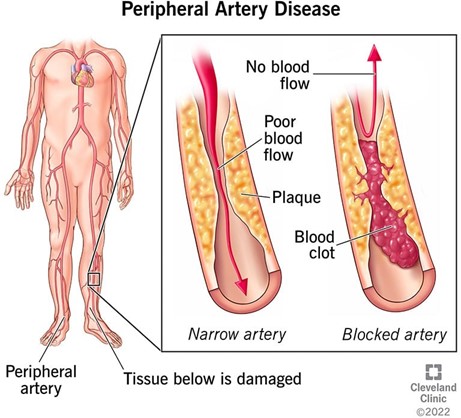A nurse is providing instructions about foot care for a client who has peripheral arterial disease.
The nurse should identify which of the following statements by the client indicates an understanding of the teaching.
"I rest in my recliner with my feet elevated for about an hour every afternoon.".
"l apply a lubricating lotion to the cracked areas on the soles of my feet every morning.".
"I soak my feet in hot water before trimming my toenails.".
"I use my heating pad on a low setting to keep my feet warm.".
The Correct Answer is B
The correct answer is: b. “I apply a lubricating lotion to the cracked areas on the soles of my feet every morning.”
Choice A reason: Elevating the feet for long periods is not generally recommended for clients with Peripheral Arterial Disease (PAD). This is because elevation can decrease arterial blood flow to the feet, which is already compromised in PAD. The goal is to promote blood flow to the extremities, and elevation might work against this, especially if done for extended periods.
Choice B reason: Applying a lubricating lotion to the feet, particularly on the soles where the skin can become very dry and cracked, is beneficial for someone with PAD. It helps to maintain skin integrity and prevent skin breakdown, which can lead to serious complications due to the reduced blood flow and healing capacity in PAD.
Choice C reason: Soaking the feet in hot water is not advisable for individuals with PAD. They may have reduced sensation in their feet due to poor circulation, which increases the risk of burns from hot water. Additionally, prolonged soaking can lead to maceration of the skin, making it more susceptible to injury and infection.
Choice D reason: Using a heating pad, even on a low setting, to keep the feet warm is risky for clients with PAD. Due to decreased sensation from poor circulation, there is a danger of burns because the client may not feel how hot the heating pad is. It’s better to wear warm socks or use room temperature control to keep the feet warm.

Nursing Test Bank
Naxlex Comprehensive Predictor Exams
Related Questions
Correct Answer is B
Explanation
This statement indicates that the client understands that genital herpes lesions can take time to heal and that they may not resolve immediately.
Choice A is incorrect because antibiotic ointment is not used to treat genital herpes lesions.
Antiviral medication is used to manage symptoms and prevent outbreaks.
Choice C is incorrect because natural skin condoms are not effective in preventing the spread of genital herpes.
Latex condoms should be used during sexual intercourse to reduce the risk of transmission.
Choice D is incorrect because the duration of antiviral medication treatment for genital herpes varies and may be longer than 3 weeks.
It’s important for the client to follow their healthcare provider’s instructions for taking medication.
Correct Answer is C
Explanation
Prealbumin is a protein that is produced by the liver and is used as a marker of nutritional status.
It has a short half-life, so changes in pre albumin levels can reflect recent changes in nutritional status.
Monitoring pre albumin levels can help assess the effectiveness of total parenteral nutrition.
Lipase is an enzyme that is produced by the pancreas and is not used to monitor overall nutritional status.
B) C-reactive protein is a marker of inflammation and is not used to monitor overall nutritional status.
D) Creatinine is a waste product that is produced by muscle metabolism and is not used to monitor overall nutritional status.
Whether you are a student looking to ace your exams or a practicing nurse seeking to enhance your expertise , our nursing education contents will empower you with the confidence and competence to make a difference in the lives of patients and become a respected leader in the healthcare field.
Visit Naxlex, invest in your future and unlock endless possibilities with our unparalleled nursing education contents today
Report Wrong Answer on the Current Question
Do you disagree with the answer? If yes, what is your expected answer? Explain.
Kindly be descriptive with the issue you are facing.
